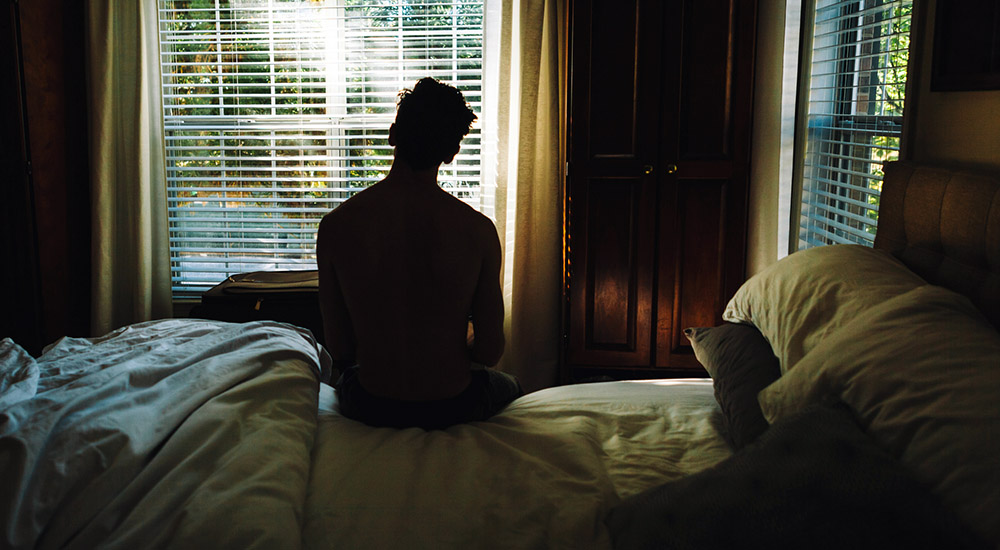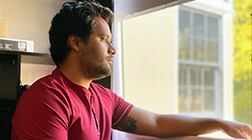One symptom that accompanies many mental health conditions, including PTSD, is trouble sleeping. This can involve insomnia, nightmares, obstructive sleep apnea (OSA), being unable to stay asleep or anything else that keeps you from getting proper rest.
Sleep issues are especially common among Veterans who have been diagnosed with PTSD. In fact, PTSD and sleep are so closely linked that treating sleep issues can make PTSD treatment more effective.
Sleep and mental health
According to researchers, sleep and mental health go hand in hand. If sleep disorders go untreated, they can interfere with recovery or possibly trigger other mental health conditions, and untreated mental health issues may interfere with sleep. Similarly, treating sleep issues and other conditions separately does not resolve either of them as well as treating them together.
Sleep-specific treatment can be easy to overlook, but it is an important element in improving Veterans’ overall mental health.
Insomnia
Characterized by difficulty falling asleep or staying asleep, insomnia is the most common sleep disturbance that Veterans report. While there are many treatments available, research has shown that Cognitive Behavioral Therapy for Insomnia (CBT-I) is the most effective and it does not require medications. PTSD treatment on its own does not seem to resolve insomnia.
Provider recommendations for insomnia include the following:
- Wind down for 30 minutes before bed
- Wake up at the same time every day
- Limit caffeine use after noon
- Avoid alcohol and drugs before bed
- Avoid the regular use of hypnotic-type medications — for example, Ambien (zolpidem) — and discuss any use of these medications with a psychiatrist
Nightmares
By some estimates, up to 90% of Veterans with PTSD experience nightmares, which are bad dreams that may replay an unpleasant memory and cause the dreamer to wake up in a panic and have difficulty falling back asleep. Nightmares can cause Veterans to relive traumatic experiences, sometimes for years.
Nightmares tend to go away with evidence-based treatment for insomnia (like CBT-I), for OSA or for PTSD (prolonged exposure therapy, cognitive processing therapy).
Providers recommend using breathing techniques to calm down after waking from a nightmare. In addition, you can talk with your provider about insomnia, OSA and PTSD treatments and medications (like prazosin) to decrease the frequency of nightmares.
Obstructive sleep apnea
OSA refers to pauses in breathing (called apnea) and shallow breathing (hypopnea) that disturb a person’s sleep cycle. OSA can look like heavy snoring and intermittently waking up. It may be underdiagnosed since the sleeper is half-awake when their sleep is interrupted. Because signs and symptoms of OSA can be hard to pinpoint among Veterans with PTSD, researchers advise that any Veteran with PTSD take a home sleep test.
Using a positive airway pressure (PAP) device is the most effective treatment for OSA. It is normal for it to take a little while for PAP users to become comfortable with the device. In addition, losing weight and sleeping on your side can decrease the severity of OSA.
Taking the next step
By addressing sleep disturbances alongside PTSD treatment, Veterans with PTSD are likely to see better results and have a better quality of life. Speak with your VA care team if you have PTSD to develop an effective treatment plan that addresses both sleep and PTSD issues.
More information and help
Visit the Healthy Sleep section of My HealtheVet to learn the importance of good sleep and to find tools and information for Veterans and caregivers.
- Learn about the benefits of the Path to Better Sleep training and then get started with the app, which can help you set a sleep schedule, track your sleep behavior and reduce negative thoughts.
- Watch Veterans share stories of their sleep troubles and learn how they got help at MakeTheConnection.net.
- Download the Insomnia Coach app to help track your sleep patterns and manage sleep difficulties.
- Read this blog post for suggestions on how to manage your sleep.
Topics in this story
More Stories
Bob Jesse Award celebrates the achievements of a VA employee and a team or department that exemplifies innovative practices within VA.
The Medical Foster Home program offers Veterans an alternative to nursing homes.
Watch the Under Secretary for Health and a panel of experts discuss VA Health Connect tele-emergency care.








A supplement called Snooze In helps because it has Melatonin and is the first combination I’ve found that works, but take it with L-TRYPTOPHAN too!! There was an EXCELLENT one on the market for awhile but it was so good, they got bought out by big pharma. Taking away meds IS BS. Thankfully, herbs are not illegal and if you live somewhere where CBD is legal, even better. You can get a dosage that does not get you high, if you so prefer. To the physician who wrote this: I would really like to see a study done comparing Vets with PTSD against a control population and do blood levels on Adrenal Factors. Too bad no one probably has a baseline of before and after. Just a thought. I was in the Army, then Alopathic Care and ultimately Alternative Medicine until one too many back surgeries, which I should not have done. I now have Adrenal Insufficiency. At first they thought it was secondary, but the diagnoses was changed to Primary in the end. Took me months to get help, years to start functioning at all, and the rest of my life on hydrocortisone. And that wasn’t even at the VA! For all the rest of you, I really recommend meditation, herbs and alternative care for yourself. Whatever you can afford, Too bad insurance won’t cover it. Look into sound therapy, herbs, CBD, CranioSacral Therapy, Energy Healing, etc. But like I said, they don’t make it affordable. Some providers give discounts to Seniors and/or Veterans. Take care. I think it rather strange that first they mess with medications, then it’s the C virus, and now all the CPAP machines (most) have been recalled. Probably coincidence??? Yea,,,,,
I just feel pretty angry about everything. Yes I have nightmares and it seems no one understands. I don’t trust anyone and I especially don’t trust anyone I have recently worked with. I am not happy and I am angry about it all. I feel horrible. I feel hopeless. The nightmares don’t go away.
There is no cure for PTSD, only band aids. It is embedded in your brain. I am a 75-year-old Viet Nam veteran. Yes, there are some things to help minimize it, but nothing will remove it. It still affects my life since 1967. When I was in Viet Nam my brain became trained to listen for certain sounds at night. Most of the time I was there I never had “deep sleep”. My brain became trained to alert me to certain sounds and wake me up. I still suffer from it to this day. The VA has tried to help me with drugs and therapy but no results. Some of their recommendations before bedtime do help some but there is no cure but lobotomy or death.
Have you tried medicinal THC?
I have had sleep issues since 4 July 2019. I see a therapist, shrink and a dictor and not one of them can or is willing to help me. Frequent nightmares are in there too.
I was damaged in Vietnam in 1971, ingested Agent Orange everyday, and had contracted Malaria which was misdiagnosed as an allergic reaction to Chloroquine. That’s bull. I never once had a reaction to Chloroquine and it helped me temporarily, but the brilliant Army doctors stopped the treatments and it came back, over and over for decades. Until I was introduced to Zolpidem, I never got good sleep. It was Excedrin PM, Alcohol, a dozen various sleep aids, or I got no rest at all. I do not believe this article what so ever. When will the VA get real doctors? It’s not the Zolpidem. Try looking at the facts.
This sounds like a reason to not help veterans. You think deep breathing and no caffeine is going to help my 82 year old Vietnam Veteran sleep!?! Waste of time now just like it was when we played that game years ago. No medication? That’s helpful. My husband still has nightmares of being buried under his team that was killed and he survived. Do you think deep breathing will calm him when horrendous images he saw show up at this time of year , especially!
I’m so tired of unreasonable ideas that don’t help. VA took away pain meds. Took away his sleep meds. It’s addictive, they say.
We can’t put these veterans in a circle and have them think happy thoughts so this goes away. We went to therapy when the goal was to get this “ garbage up and out”. That was supposed to help. It DID NOT! We went home with all that garbage on his mind.
Now you want him to calm himself and breathe. Now he can sleep. This must have been created by another young person that’s never saw war, death, mutilated bodies, and unspeakable events. Breathe! That’s a laugh and you all know it
I am a veteran and a therapist (not with the VA). I have PTSD from both combat (wasn’t a therapist then) and from MST. The reason properly used breathing techniques work that that they release dopamine, our feel good, calming neurotransmitter that God gave us in his wisdom. When I first heard about deep breathing to help with anxiety and such, I thought it was a lot of hooey too. That was until I learned WHY it works. It is not a cure all,. There is no cure all for PTSD. It takes a combo of talk therapy, some non addictive medications and work by the person who has it. It never really goes away, it’s just kept at bay but it is manageable. I still have my bad time, but I do not end up with a gun at my head like I did in the past.
I agree with you. I saw a sleep Doctor. Done a sleep study twice. Went through suicide prevention with the VA. The sleep doctor the had me see because my physiatrist gave me sleep meds and so thus the VA had me see a sleep therapist. I felt I had no choice in the matter. It made things worse and it made me distrust the VA. I am sorry in a way I feel that way. I suppose I am angry about it all. In addition to PTSD I have a knee injury and there are nights it keeps me up and there are nights I can’t sleep and then I have nightmares. It’s like I feel like they are trying to put me in a box. Well if I am denied the sleep meds I will use alternate means as I have done before. I feel hopeless. I didn’t like the whole experience with the sleep Doctor. I think she was a nice person but what she was trying to implement didn’t work for me and made things worse.
Yes I use the insomnia Coach App . Winding down before sleep helps a lot. I like to read.. I use Prazosin 1mg and 6 mg of Melatonin. I also have a Counselor, Psychiatrist , and a Doctor. I go to Willimantic and Newington Ct. V.A facilities. This so far has worked well for me.